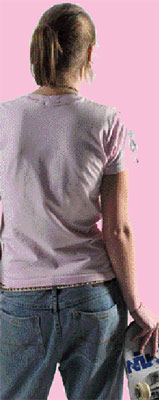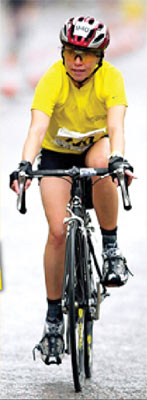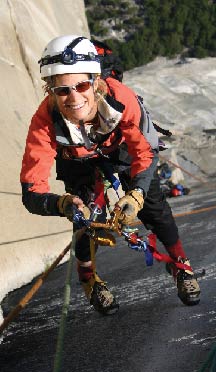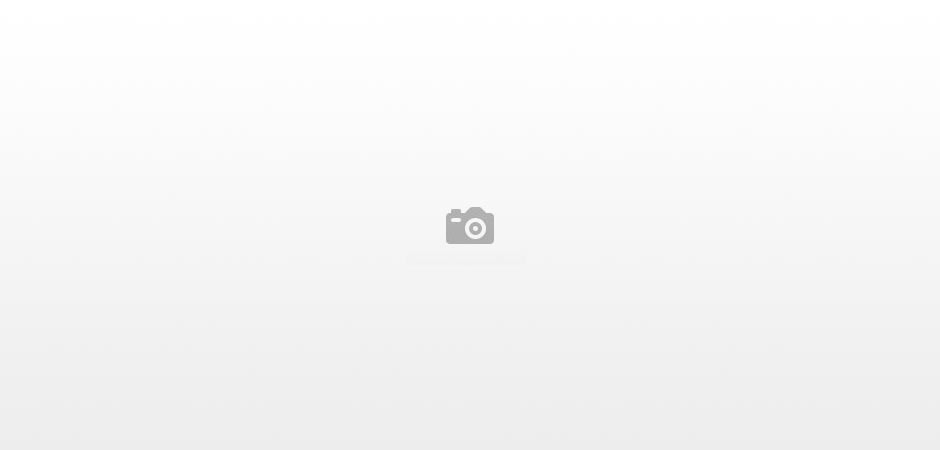Inspiring stories and tales of the unexpected.
Words by Kirsty de Garis
‘I’m just a skater girl …but I’m tipped to be Britain’s next millionaire.’
Skateboarder Lucy Adams, 22, may just be a student, but she still scooped a place on a prestigious list of future millionaires.

‘As I draw closer to graduating from my degree in management and leisure at Manchester University, my relatives are asking more questions about what I’d like to make of my future. They can’t understand that I’m 22 and still want to roll about on a plank of wood. My mum says, “Welcome to the real world, Lucy!”.
I got hooked on skating several years ago in Horsham, where I grew up. I used to be a swimmer and trained a few times a week at the leisure centre. I was about 13 when the centre got skating ramps built outside. I took my pair of roller skates out there and had a go.
The boys used to look at me and laugh, make jokes out of it. So after two or three weeks on roller skates I asked my Dad if I could get a skateboard. “It’s going to be dangerous,” was his reply. But he didn’t say no and, the moment I got one, I was hooked.
The best part of learning to ride at a new facility was that everybody there was a beginner. We learned together and helped each other. I was the only girl, but that was never an issue. I got better on those ramps outside the leisure centre and then started to compete in some social competitions.
The UK national girls’ competition was in Birmingham in 2002. When I first arrived there I was shocked as there were more girls there than I had seen in any competition I’d entered before. We all skated together, which eased the nerves a bit. I won that competition and attended a few more that year: the Sprite Urban Games, King of Street and Board-X.

I knew the World Globe competition was coming up in Melbourne in 2003 and I wanted to be involved. So I travelled to Australia to take part. I was really nervous, but I finished eighth overall. After the competition I did a bit of travelling around the world. Then, when I came back to Britain, mum said to me, “Some crazy people from the Royal Bank of Scotland have called and want you to be on their future millionaires’ list. You’d better set them straight.”
I have no idea why I’m on that list. I was being compared to Tony Hawk. But people like Keira Knightley and Wayne Rooney were on the list too. At the time, I was working in my Dad’s skate shop in Horsham and now I’m wallowing in £10,000 of student debt!
I don’t have as much time for skating as I used to because I’m in my final year of study. But the skateboarding scene definitely swayed my decision to study in Manchester. There are loads of ramps nearby – outdoor and street skating as well as indoor facilities, all within an hour of Manchester.
Graduating will be a taste of reality, but I’m planning to keep skating in my life. The US takes skating more seriously as a sport and it’s a big business there. But to me, skating is not so much a sport but a lifestyle. I’d like to keep it that way.’
Lucy uncovered
My favourite book: ‘Thomas Harris’s The Silence of the Lambs.’
Philosophy on life: ‘Live and let live. I enjoy my life.’
My inspiration: ‘In terms of board riding, it is certainly other board riders, local people. The people I skate with inspire me to do better. Trevor Wedd is one who springs to mind.’
’I broke my back, battled cancer twice… then won a world surf championship’
Surfer Trudy Todd, 30 astounded the world championship surf tour with an amazing comeback from illness.

‘I first tried surfing aged 15, when I borrowed a board from my pro-surfer boyfriend at the time. Mum had been on at me to try surfing for a while – I’d had had a passion for horses as a teenager and she couldn’t afford that interest of mine any more.
I met my current coach, Steve Foreman, when I attended a surf camp soon after my first surf attempt. He said I had natural ability and I suppose I must have, because within three months I’d won my first title.
If I’d tried to learn surfing the way just about everyone else does – on a long board in the white water, I’m sure I would never have been able to do it. Instead I went straight out the back, on top of the waves. I picked it up quickly. That was at Snapper Rocks on Australia’s Gold Coast in Queensland, home to many a pro-surfer.
As a teen I suffered from endometriosis (a painful condition where endometrium tissue is found outside the uterus and attaches itself to other organs) and I regularly had it surgically checked. I was surfing in Tahiti in 2000 when my back suddenly froze while I was on a wave, thanks to the pain I suffered from endometriosis. I broke my back, L4 and L5 vertebrae, and was forced to return home early.
I was also experiencing sever spasms and pain in my belly that doctors felt weren’t consistent with my injury, so I was tested further. That’s when cervical cancer was suspected. It was confirmed with a laparoscopy.
Because it was caught early, I didn’t need chemotherapy. But I still I missed the 2001 season dealing with my illness. I tried to get the wild card (one per season is granted to an injured surfer) for the 2002 tour but was denied on the grounds that mine was illness, not injury.
It was harsh at the time and I guess I hated the world for it. But that knockback only motivated me further, and I requalified for the tour anyway. I finished sixth in the competition that year. I love getting back on a board. I feel so at home in the water and proving to myself that I’m still capable is also a big motivational factor in my comebacks.
The cancer then returned in 2005. I’m frustrated by it and anxious about it, but am positive about the future and I know I can fight it. It looked like I was going to have to have chemotherapy. I chose instead to work closely on my diet. The diet I follow is difficult to stick to – it includes only organic fruit and vegetables. No meat, no dairy. I also swallow a concoction of vitamins, supplements and Chinese herbal tinctures of all kinds, mixed for me by a guy in Byron Bay.
My health seems to be linked with stress. If I feel enormous pressure from something, I get sick. I do my best when I’m happy in my relationships and last October, I won at Malibu, California I was absolutely thrilled to win. I felt like I’d shown myself and others that nothing was going to get me down. I like to think that’s from the support I’ve received from my partner, James. I am keen to have a family – doctors have warned me that the longer I leave it, the harder it may be to fall pregnant, because of the trauma on my body. I do want a family, and am thinking about retiring to have children.
I’ve been through a bit in my life. You can have far worse happen than what’s happened to me, though. These days, I know better how to leave stressful situations, which is to my benefit. I can succeed at anything I put my mind to. All I need to do now is work out what I’m going to do next. The cancer is under control and I feel positive about my future. My biggest decision now is whether to continue on the tour or retire and have a family, because I would love to have children.’
Trudy uncovered
Favourite book: You Can Conquer Cancer by Ian Gawler
Favourite quote: ‘If you believe, you will achieve’
Philosophy on life: ‘I’m not surfing to win. I don’t thrive on that. The first cash prize I won, I donated to charity. I got more of a thrill out of doing that than I did winning. Also when you win, everyone wants a piece of you and I find that stressful. I’m into helping children, surfing and protecting the beach.
Inspiration: ‘Other people’s putdowns. If someone tells me I can’t do something, my reaction is, “Yeah? Well look at this!”
‘I’ve run triathlons, ironman events and cycled from John O’Groats to Land’s End …but I have terminal cancer.’
Jane Tomlinson, 42, was diagnosed with terminal cancer almost six years ago but her awesome achievements since then have made her one of the world’s most inspirational endurance athletes.

‘I only started endurance events after I was diagnosed with terminal cancer, aged 36. I liked having small goals to work towards, that gradually became bigger and bigger. It was something positive I could work at while I was dealing with a lot of negativity.
When I was first told I was terminally ill, I was so fragile. It’s hard to be positive when you’re told something like that. The toughest thing was trying to look forward, to the future, when I was being told I had none. It was a time of great sadness.
It’s not something that you can talk to people about – having no future as such. There was no target I could aim for; no promotion I could work towards. Being stuck at this one point in my life, the running allowed me to set new targets and reach new goals.Then, in 2001, I decided to do a 5km run, with only five weeks’ preparation. I had finished chemotherapy in January of that year and not having ever run before, this was a real challenge. Running was such hard work and I was rubbish to begin with. I had tumours in my lungs and bones, and it was both painful and very hard to breathe. I pushed myself hard and was sick when I got over the line of that first run, but was pleased with the result. My target had been under 30 minutes and I achieved it. My three children would help in the kitchen at home, so I arranged different evening meals, depending on how long my runs would be. If it was a short run, I’d do a bolognese sauce and have my children put on the pasta while I was out. For a longer run, I’d start a casserole before I left. I committed to run the 2002 London marathon with a place supporting Cancer Research.

I had a terrible week prior to the London marathon. Scans had revealed that I had more disease in my bones. I felt dreadful, but I knew I couldn’t drop out. My overriding thought was that I may never get another chance. I finished in 4 hours, 53 minutes. I was delighted, but turned immediately to a new goal because that’s how I keep moving forward.
During a post-marathon interview, I found out about the London Triathlon later that year. I liked swimming but I hadn’t been on a bike in my entire adult life. I went out cycling with my brother on a tandem bike. We cycled for three days around the Yorkshire Dales and that’s when I got the idea to cycle from John O’Groats to Land’s End. I did that ride during Marck and April of 2003. Jane’s Appeal was launched in 2003. I’m hoping to raise one million pounds in 2006.
I wanted to reflect that I’m not just a cancer patient – I’m a whole person. I think you can get stuck with headlines and it’s easy to be put in a category. I’m poorly but it doesn’t stop me from living my life. I like the training as it helps control the pain.
I did the Florida Iron Man in 2004. it was the most fantastic feeling, lining up with 2,000 others on the beach. I thought I’d never be able to do it, but I did. I’m wary of saying that I heal myself through sport. I do the running because I enjoy it. It helps me manage my disease and stay positive. It allows me time with my family in that I remain positive. Committing to chemotherapy takes courage, no matter who you are. This is far worse if you’re going to die anyway. With nothing but sadness in your life, a person might choose to give in. The running gives me real positivity. My quality of life is good. ‘ www.janesappeal.com
Jane uncovered
My favourite quote: ‘I don’t have one as I don’t live my life by mantras.’
Philosophy on life: ‘You only get one chance. You never know what will happen. If an opportunity presents itself to me, I take it.
My inspiration: ‘My family. They’re the reason I keep going really.’
‘I scaled the first of seven mountains … just 10 months after having a heart transplant.’
Kelly Perkins was 30 and a true lover of the great outdoors when she was given a week to live. A decade on, the courageous heart transplant patient has devoted her life to campaigning for organ donation.

‘All my early dates with my husband Craig were outdoors and in those situations where you really get to know a person. We got pretty soulful pretty quickly in the mountains.
We had been holidaying in Europe enjoying the outdoors, when I noticed my heart racing for no apparent reason, mostly when I was just in bed resting. I knew it wasn’t right so I visited the doctor. That first Electrocardiogram (ECG) test indicated that everything was normal and the doctor sent me away with a referral to a psychiatrist.
It was only because we were headed out of mobile range for a weekend in the mountains that I visited the doctor again before I left as a precaution. This time when I had the same test, my heart was beating at 200bpm while resting. This was abnormal but I looked so healthy and was running daily without difficulty, which is unusual for people with heart conditions. I was admitted to hospital for a biopsy.
The biopsy revealed that my heart had been attacked by a virus, and scarring had caused an eruption in its electrical cycle. Our lives changed at that moment. Immediately I was given medication to control my heart rate: the doctors believed that if my heart rate was suppressed, my heart would have the opportunity to repair itself. But in the year I’d been given for my heart to heal, I made no progress. I had to drastically change my life and the outdoors was out. It had been what Craig and I had loved to do as a couple, and this was an enormous adjustment.
I lived with my declining heart for three years before I went into heart failure. I was given a week to live, but a heart came for my transplant within 24 hours.
Ten months after my transplant surgery, I hiked Half Dome, at Yosemite National Park, California. This was a one-day, 17 mile climb and the 12 hours that it took me to complete was way too much for my body at that time. Had it been easy, I’d probably have thought I was fine and I wouldn’t have had this passion to go out and re-prove myself again and again. I have continued with my mountain climbing to prove that I am healthy. After each challenge I’ve met, it’s a bittersweet happiness. I’m happy to have a shower and some rest; I’m sad it’s over. I think, “Wow, how do I top this?”

A lot of publicity accompanied my second climb a year later, of Mount Whitney, also in California. This made me see the impact that could be made on the public.
When we climbed Mount Fuji in Japan, my husband surprised me with the ashes of my heart donor to scatter. This was at the request of the donor’s daughter. I don’t know of any gesture that could be more profound. It was extremely emotional and a beautiful act. It was also the final movement in the process of me being able to accept this heart as my own. It took three years before I could think, ok, this heart is mine. It can be really tough at times, but I can’t imagine where I would be today without having experienced what I’ve been through.
It’s tragic enough to lose your heart. I had no time to process the impact that losing my heart would have on me, but I believe this saved my spirit. I would like others to have their spirit saved, to have another chance at life as I have had. I realise I’m a lucky one.
I have climbed countless mountains for training and fun, but in terms of raising awareness for donors, I have reached the summit of seven mountains. Organ, blood and tissue donors have the opportunity to save lives and enhance many more. The trickle effect of both donors and recipients is tremendous.’
www.craigandkelly.com
Kelly uncovered
Favourite quote: “Don’t let what you cannot do interfere with what you can do,” John Wooden, Basketball coach.
Favourite book: The Power of Myth, by Thomas Moore.
My Philosophy: ‘In facing an obstacle, personalise, embrace it, and turn it into a challenge. I have physical limitations but these can be strengthened by being present with all my faculties: mental, physical, emotional and spiritual. I’m also not afraid to surround myself with stronger people (my husband, medical experts) who help bring my “game” to a higher level.’
My inspiration: ‘I was fortunate to have a doctor, Dr. Cannom, before my heart transplant when I was very sick, who not only kept me physically alive but emotionally alive as well. He drilled into me that I am never to lose sight of my passions and dreams, and never to give up planning for my future, regardless of how bad things get. Doctor Cannom is second only to my heart donor, which goes without being said.’ My motivation: ‘Time and health. I feel like I don’t have time to waste. I’m motivated to fit as much into my life.

